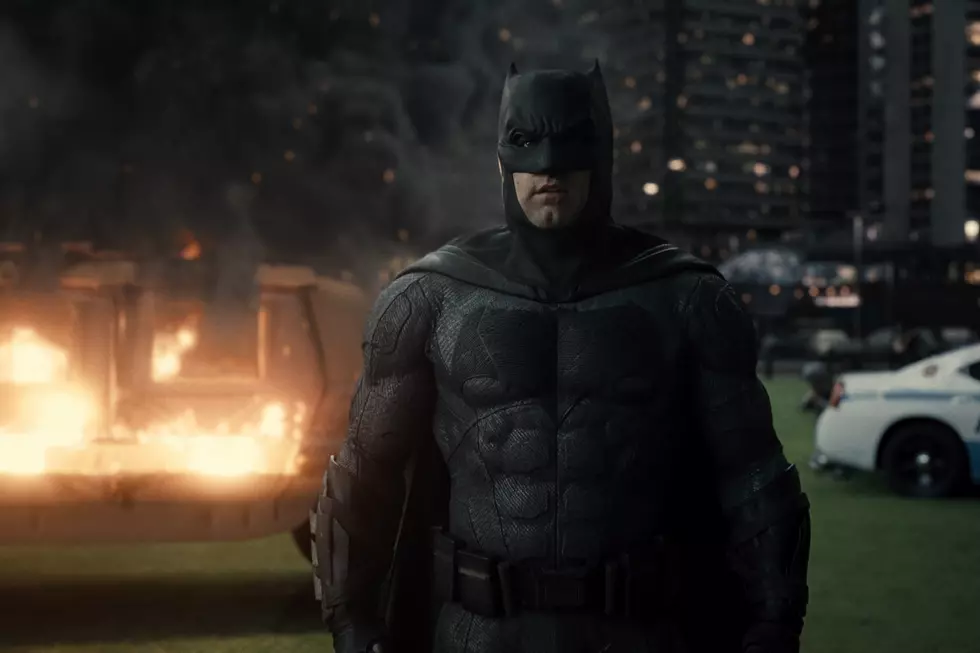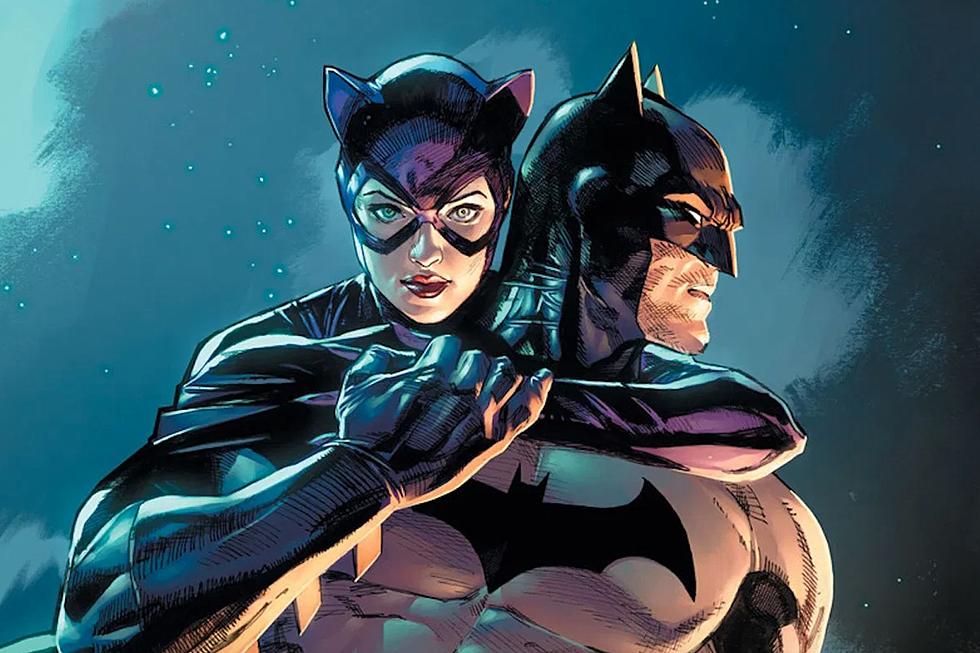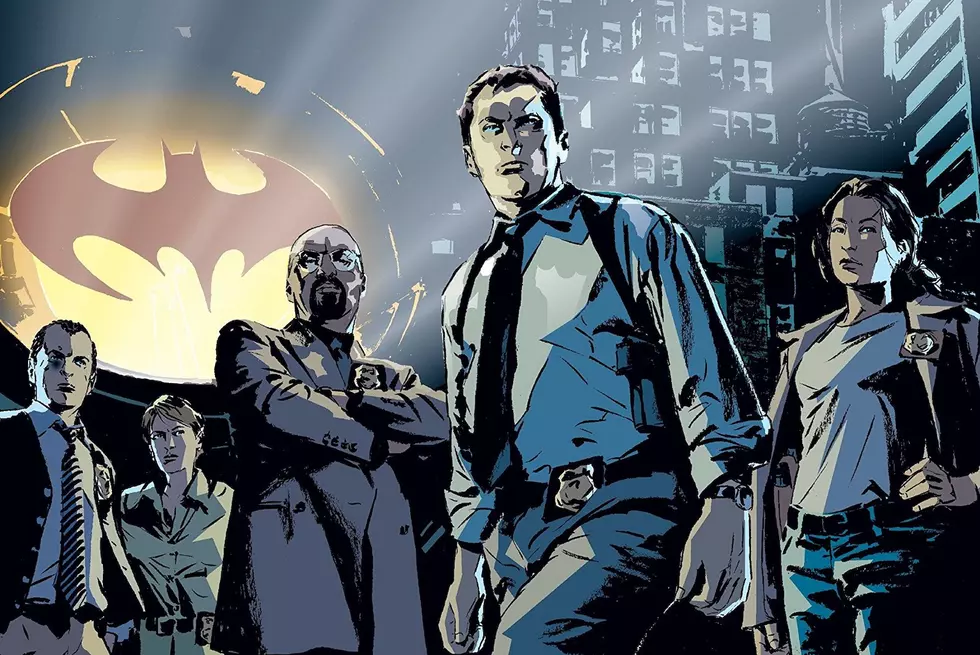
Ask Chris #177: Reformation ’66
Q: Do you think that, for all their superficial campiness, the Adam West Bat-villains are actually the least likely to reform or even feel bad about the crimes they've committed? -- lego-joker
A: I'll be honest with you, folks: I got this question on Tumblr a few days ago, and while I wrote a (relatively) brief answer over there, it's something I've been thinking about ever since. Fortunately, it's my column, which means that the only rule is that there are no rules. And, you know, the weekly deadline. That is a pretty serious rule if I intend to stay employed.
Point is, there's a very simple answer to this question, which is that it's absolutely right. The arch-criminals of Batman '66 will never, ever reform, mostly due to the fact that nothing is ever meant to change on that show. There's a status quo that has to be maintained, one that's even more strict than the one in the comics. But at the same time, that lack of momentum says a lot about how those characters and the world in which they live are constructed.
The thing about Batman '66 is that it's a heck of a lot smarter than it usually gets credit for. It had to be -- that's the only way that a show like that, meant to appeal equally to both wide-eyed kids enraptured by the brightly colored heroism and the smirking adults who got a laugh out of the irony of the same. I think that's the reason so many people have this visceral hatred for the series, even now, when it's experiencing a renaissance thanks to finally getting some merchandise deals worked out: The show was every bit as good at satirizing its subjects as it was at representing them with a pretty fair amount of accuracy.
The flattened characters were a function of both, really. The Comics Code prohibition against glorifying crime and the hidebound storytelling of the Silver Age meant that the bad guys couldn't ever be shown as sympathetic. They existed purely as obstacles to be overcome, and when the TV show came around, it flattened that down even further. The villains were the big draw of '66 in more ways than one -- they were the choice roles that had big-name actors requesting parts, and that constantly stole the show from West and Ward, whose major function was to act as a straight-man soundboard for the arch-villains to bounce off of -- but in a lot of ways, they were cookie cutter parts. The quirks of the crimes were different, of course, with cat's eye opals, gold-plated sarcophagi and valuable clown paintings all reserved for the appropriate villains, but if you swapped out a couple of adjectives and a bit of set dressing, one could work as well as the next. The motivations were all the same, particularly in that they didn't actually exist.
The crooks of Batman '66 didn't really have any life-changing, motivating tragedies -- and, incidentally, neither did that version of Batman. They just had affectations, high pitched giggles and sparkly catsuits that were applied to the same formula of crime and deathtrap. Nobody ever really seemed like they were that hard up for cash, so crime wasn't a vocational thing for them. They didn't need the money they'd get from heisting the ancient riddle scrolls or whatever, and there's only really one episode I can think of where someone is actually frustrated at being unable to fence stolen goods and actually profit from the crime. It wasn't about the money for them, it was about the act. They weren't just criminals, they were arch-criminals -- they only existed to break the law, committing crime simply for crime's sake.
And I love this idea.
I've mentioned before that my personal view of Batman involves an evolution of both crime and crime-fighter. Bruce Wayne's parents die in a very, very simple criminal act. There are versions that take away the randomness of the crime and make it an act of retribution for something Batman's father had done before, and in a way, that works -- it shows you a world where no good deed goes unpunished, establishing that even a stalwart pillar of the community like Thomas Wayne can't really fight against a system that irrevocably corrupted -- but I love the simplicity of a mugging gone wrong in a place where they thought they were safe. Wrong place, wrong time, one man, two shots. That's all it takes to change everything, to show Bruce that he's living in a world where there is no safety from crime.
The act that takes away his parents is, Biblically speaking, the oldest crime in the book. It's a simple crime, so he makes an equally simple promise: to end crime. And he does. That's one of the great things about Year One and Nolan's Batman Begins and The Dark Knight: they show us that the very first thing Batman does is the last battle against crime as we know it. When Miller and Mazzuchelli show Batman snuffing out the flames on Carmine Falcone's dinner table, they're showing us the end of an era.
But that's only one facet of crime, and if Batman is a new kind of person, someone with limitless resources and fantastic determination, then Crime is going to have to evolve to keep up with him, metastasizing into a purer strain of criminal. Just like Batman no longer really needs to avenge the death of his parents, the criminals of Gotham City don't really need to profit from their crimes, making them a means to an end. Crime is the profit, evil is the end, re-establishing that imbalance, trying to inject that element of fear and chaos back into a city that outgrew traditional ideas of evil. There aren't any more muggings in Gotham City, there are trick umbrellas, explosive birthday cakes and skywritten riddles. One is just as chaotic as the next, but there's a logic behind one that, without Batman, is absent in the other.
If you take that idea and flatten it out, ironing out all the psychological complexities and simplifying it for a 22-minute time slot every Tuesday and Wednesday, smoothing everything over with a healthy amount of irony, you're left with Batman '66: Criminals who commit crimes purely for the sake of crime, and a crimefighter who battles against them purely for the sake of the law.
That's one of the reasons that I think the show got away with only mentioning Batman's origin once in the pilot and then never bringing up his parents' murder by "dastardly criminals" again. By flattening everything out, they were left with a hero who was every bit as compulsive as his villains, only on the opposite side of the scarred-up coin. It's why Batman is relentlessly square, obeying every law to a fault. He's the embodiment of the Law, the opposite of Crime. One of the most important distinctions the show makes -- also a product of the comics -- is that Batman isn't a vigilante. He's a duly deputized agent of the Gotham City Police Department. The hotline phone isn't just a good visual and a convenient bit of of TV storytelling, it's also a great visual signifier for how the character works. He's the cops' cop -- the person the police call when there's a crime. He's that much of a crimefighter.
There are a couple of really interesting things about the way that's set up. First is that eliminating the origin and the setup of Batman's war against crime in favor of arch-villains recasts him as a more reactionary hero. The villains always act first, taking the initiative away and forcing him to react. They set the challenges that he has to rise to, and as a result, those challenges are almost always tailored specifically for Batman. The Riddler's the best example, delivering his crimes with literal written invitations for Batman to solve them.
There's a reason he's the lead-off villain in the very first episode of the show. He sets the tone.
The same idea is why the show occasionally dips into stories where Batman and his foes are competitors in addition to being mortal enemies. "Surf's Up, Joker's Under," in which Batman and the Joker have to win a surfing competition, or "Hizzoner the Penguin," in which Batman and the Penguin face off in a mayoral election, are often held up as the height of the show's excesses in this regard, but really, they make a lot of sense if you look at them the right way. If the criminals can best Batman, then they point out his flaws. If Batman is flawed, then the law itself is flawed, and crime becomes a viable alternative in its own right. The faith of the people is shaken, they start to wonder why we're bothering locking these people up, they give into fear, they surrender themselves to rule by criminals and psychopaths. If Batman takes second place in a surfing contest, the whole system comes crashing down.
The second thing is that it brings this interesting idea of fatalism into the story. The criminals commit crimes because they are capital-C Criminals, compelled to do so for no reason other than Crime For Crime's Sake, and Batman (along with Robin, Batgirl, Alfred and, to a lesser extent, Gordon and O'Hara) battles against them because he's just as compelled. It's who he is -- you can't imagine square, stentorian '66 Batman committing a crime himself any more than you can imagine him flapping his arms and flying to the moon. It's just not in his nature.
And, to bring it back at last to the original question, neither can the criminals.
My all-time favorite moment of the show, right up there alongside Surf Jams Joker and Robin being vexed by a gang of mod pickpocket schoolgirls in Londinium, is from "Catwoman Goes To College"/"Batman Displays His Knowledge." You can probably guess the premise from the title, but the end of the episode is great. There's a blatantly sexual seduction scene that's stuck in my memory from the first time I saw it for a variety of reasons...
...but the one that's important for our discussion today is that Catwoman, even though she's working an elaborate deathtrap, seems to genuinely want to be with Batman, and he genuinely wants to be with her. She tells him that they can be together, the two of them "against the world," just as they both want. But when he asks about Robin -- two being a number that does not allow for sidekicks -- Catwoman's response is a blunt "I'll have him killed, painlessly."
West doesn't get the credit he deserves for the acting he did on this show, and neither does Julie Newmar. Her matter-of-fact delivery and the way he tenses up are fantastic, despite the well-earned reputation for campiness, and it says so much about those two characters. Catwoman, even when she's reaching out, is quite simply incapable of thinking without considering crime. She's not even being malicious about it -- giving him a painless death is actually a step up, an act of unbridled kindness compared to 15 minutes before, when she was trying to drown the dynamic duo in boiling hot coffee. That, to her way of thinking, is as appealing a solution as there can possibly be. He's out of the way, he doesn't suffer, so what's the problem? But for Batman -- and, hopefully, the audience -- the suggestion of murder just to make one's life more convenient is anathema. It's where the tone of the scene changes, where the attraction in West's voice is gone and he resumes his righteous proclaiming.
When I wrote about this scene and how much I love it on Tumblr, a reader pointed out that this is actually more vicious than Catwoman's comic book counterpart, who (at the time) was a thief, not a killer, something that set her apart from Gotham's other villains. I think that's a function of the ironing-out process mentioned above, but it also points to another idea that springs out of all this talk about reformation. Putting those limitations on Catwoman keeps her as exactly the kind of viable romance that she isn't on the show. Theft can be more easily forgiven than murder, after all.
That's the way it is for a lot of female villains, characters that seem to be evil only as long as there's not a man around whose love can turn them into a good woman, something that puts them in a pretty dubious place as characters. Don't get me wrong, Catwoman's one of my all-time favorite characters, and I love her just as much as the unrepentant special guest villainess of Julie Newmar's performance as I do with Ed Brubaker, Darwyn Cooke, Brad Rader and Cameron Stewart's antiheroine of the East End. She's not the first one to fill the role, either, and I like Princess Aura from Flash Gordon too. But still, the evil woman who has to be smooched over to the side of the angels is a trope that's pretty insultingly overwhelming when it comes to villainesses.
That's one of the reasons that I think the Baroness from G.I. Joe is such an important character, my pattern of affection for haughty, bespectacled brunettes notwithstanding. With the exception of the hilariously awful character assassination in the live-action movie, she's a fully unrepentant villain, evil by choice and not likely to be seduced away from her life of international terrorism. Her descent into evil is based on a misunderstanding of events, but so is Dr. Doom's, and neither one of them is going to be lured into heroism by Channing Tatum and his smile. You could probably argue that the Baroness is certainly influenced by Destro, but that came as a result of her devotion to Cobra, not the other way around. Besides, who isn't influenced by Destro?
Point being, she isn't going to be seduced from her path in life, and neither is Newmar's Catwoman, even with her obvious affection for Batman. But for the latter, there isn't even a choice. She, like the other '66 villains, is trapped by a flattened, fatalistic view of morality, a reason for being that predicates her entire existence on villainy.
They can't change. There's nothing to change. They're arch-criminals, existing in service to crime.
Ask Chris art by Erica Henderson. If you’ve got a question you’d like to see Chris tackle in a future column, just send it to @theisb on Twitter with the hashtag #AskChris.
More From ComicsAlliance









